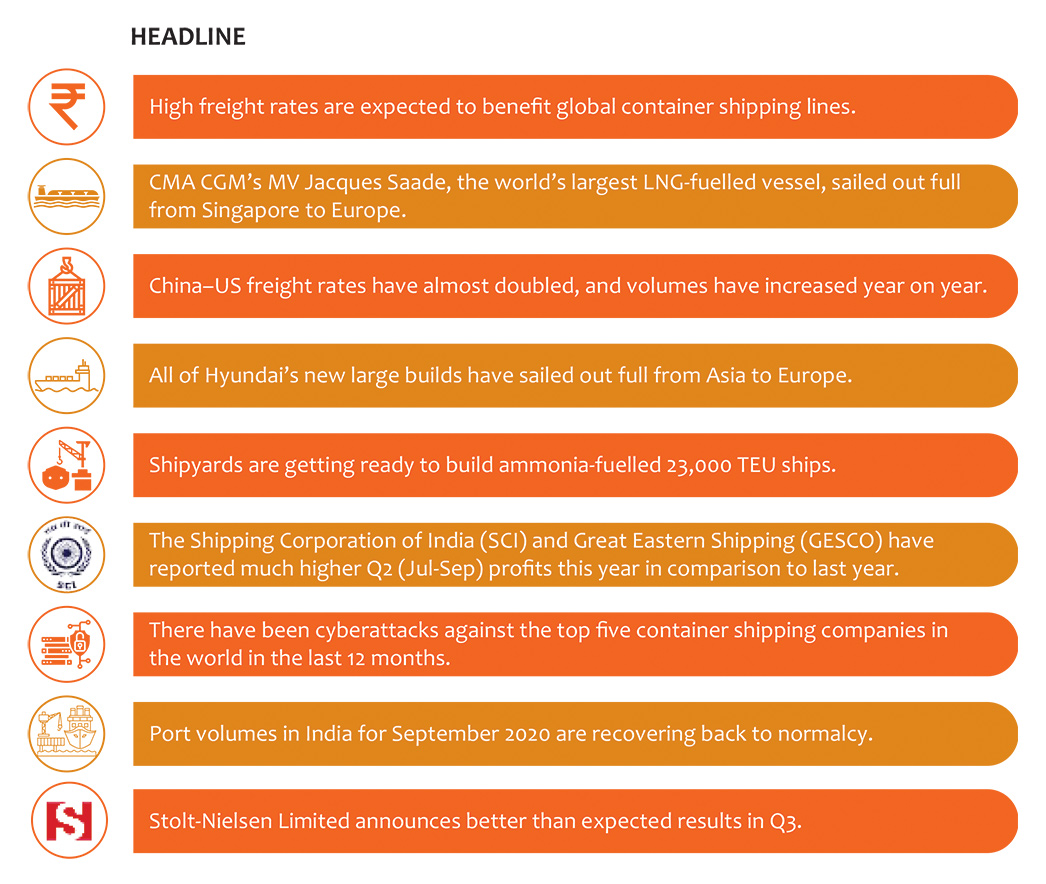
Dear Friends and Colleagues,Here are some headlines that were hard to miss in the last few weeks:

Such headlines and many more bring to the fore earlier discussions about whether the recovery will be L-shaped, U-shaped, V-shaped, W-shaped, etc. Whilst some of these headlines do suggest that there will be a V-shaped recovery, there is also talk of a K-shaped recovery, which basically means that different sectors of the economy will react differently to the pandemic. So, whilst airlines, airports, hotels and movie theatres have been badly hit, ports, shipping lines, pharmaceuticals, etc. are better off.
The beginning of 2020 saw the introduction of low-SOx fuel or scrubbers if non-compliant fuel is used. The shipping industry was encouraged to use gas as a cleaner fuel. Until recently, only smaller ships, barges and coastal vessels have experimented with LNG; however, the maiden voyage of MV Jacques Saade carrying 22,000+ TEU ex Asia to Europe as a LNG-fuelled ship is a milestone. Along with this news, it is also exciting to read that shipyards have begun to work on the possibility of ammonia-fuelled ships. The next 2 to 3 years are likely to see rapid developments, and it may well turn out that by 2035 or 2040, the old dirty fuels, including low-SOx fuel, may have been totally phased out. This is an opportunity to create a suitable fuelling infrastructure in various parts of the world.
The monsoon has just concluded in India, and the present standing crop promises a record harvest for cereals, pulses, oilseeds, cotton, sugar cane, etc. This is fantastic news because during the worst of the pandemic, agricultural commodities continued to be shipped out of India to various international destinations. The government of India has enacted new laws specifically pertaining to agriculture, which promise to make the lives and livelihoods of farmers easier and better by enhancing marketplace opportunities for them.
Whilst on the subject of laws, a new law – the Major Port Authorities Bill 2020 – has been promulgated in place of the Major Port Trust Act 1963, in keeping with the changed times and to cope with the new generation of ports and ships. Similarly, the government of India is proposing to enact a new National Logistics Policy, which would enhance cost competitiveness, transparency and digitalisation in the logistics and supply chain of India.
India has been committed to becoming an increasingly better connected and integral part of the global manufacturing base and supply chain. The main requirements for achieving this are a good infrastructure, a specialised and skilled workforce, capital, technology, digitalisation and logistics. This endeavour has seen continuous momentum in the last few difficult months, which gives us confidence that this ongoing effort will continue to see traction and growth.
It is also fortuitous that our terminals are in areas that are seeing successful projects by local authorities, economic participants and other stakeholders, who have created transport hubs near our sites. What makes this all the more exciting for us is that by next year, we will be able to pursue our ambition of setting up free trade warehousing zones and to participate in the logistics hubs being developed by ports that are close to our terminals in Vizag, Paradip, etc.
On the shipping front, container shipping has had a remarkable six months of unstoppable growth. With the demand for cargo on the rise, it seems that there are good days ahead for this sector. The tanker market has not had a good run, but still, it continues to be in positive territory. With volumes in the bulk trade growing, some amount of stability, if not strong profitability, is apparent. The LPG ships were the clear winners in this period, and their future looks steady. The oil and gas sector remains deeply distressed, and it is hard to spot any signs of recovery.
The other and perhaps, the main, winners during this period were technology and digitalisation businesses. Working from home, faceless transactions and assessments, and paperless processes are all the new normal.
Government authorities, like customs, the port authorities and DG Shipping, and the banks have all enabled this transition from the old to the new.
Our group has continued to remain in positive territory in terms of volumes and growth. With a gradual revival of the global economy and demand, we should see growth ahead. Our technology business Portall and DIABOS are positioned to be the new normal.
In our previous two issues, we discussed and pictured wheels in motion and featured the people behind the wheels, respectively. This issue continues with the same themes, but also “the time starts now” and that “time and tide wait for no one”. In many ways, these topics highlight the essence of the J M BAXI GROUP of companies, since each and every one of us is trying to keep the wheels in motion, especially the people behind the wheels. Moreover, because we recognise that time and tide wait for no one, it is crucial that we continue to make good progress.
I hope you enjoyed reading this and catching up. I would also like to take this opportunity to wish each one of you and your family members a joyous and prosperous Christmas and New Year.
Stay safe, healthy and happy.
Signing off from the quarter deck of Tidings.
Krishna B. Kotak
Chairman - J M BAXI GROUP